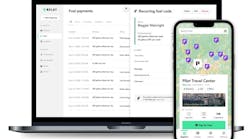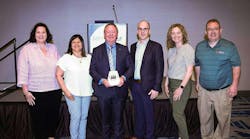Where do you start explaining why an operation that is by any measure one of the nation's top truckload carriers has been named for-hire fleet of the year? One place to begin is where they are right now. At year's end, U.S. Xpress is expecting to announce its entry into a very exclusive club — truckload fleets with annual revenues of a billion dollars. It will be only the fifth carrier to attain that exalted rank.
Co-chairmen Max Fuller and Patrick Quinn are the founders and guiding force behind the U.S. Xpress juggernaut, which they say has been successful thanks to a corporate culture that stresses “growing relentlessly” by understanding, assessing and responding to customer demands and, just as importantly, market conditions.
“Back around 2000,” says Quinn, we were primarily a long-range cross-country carrier. But over the past four years, we have changed our model dramatically. We now draw a substantial portion of our business from dedicated and expedited services.”
“If you don't change every five or six years in this business,” Fuller says, “you will become out of sync — you must always be looking for the next opportunity. We're a service industry so we've got to be knowledgeable about where the market is and go there. We find out what the customer is willing to buy and provide it.”
Right now that means being one of the largest providers of expedited and “time definite” services in the truckload sector.
But the fleet's success is not built only on responding to the customer. It can't be, according to Fuller and Quinn, because just as changeable are market conditions affecting how business gets done.
“One of the key conditions affecting us that we have to stay on top of is the driver situation,” explains Fuller. He says to keep them coming to U.S. Xpress and staying onboard, the fleet “must deliver solutions for them, to address their lifestyle issues.
“The recent changes in our business have certainly been driven in part by the driver situation. We knew more and more of them want to get home more often; there's really only a handful who still want to live on the road.” Offering dedicated, expedited and regional services of course makes it easier to get U.S. Xpress drivers home at least once a week or several times a week, with some even getting there every night.
But that's not all it takes today to secure a driving force. “We also must give drivers higher pay, as well as freight they don't have to load, no waiting time, and good equipment that is productive but also safe and comfortable,” Quinn points out. “There is a capacity issue, so our customers are willing to cooperate.”
Well-known as U.S. Xpress is as an early adopter of driver-oriented safety and productivity technology, the co-chairmen emphasize it's not a matter of technology for technology's sake.
“We have collision-avoidance systems on all our trucks, we're putting blind-side camera systems on new trucks and are spec'ing automated transmissions,” says Quinn. “Such decisions are based on their impact on safety, payback, productivity and driver comfort.”
“But technology cannot replace the driver,” adds Fuller. “Technology must work with the driver and the job at hand.”


